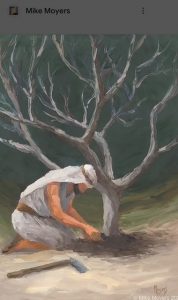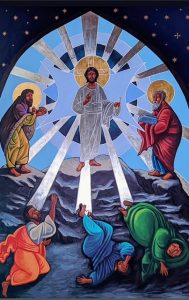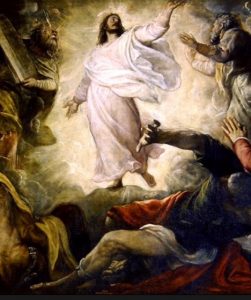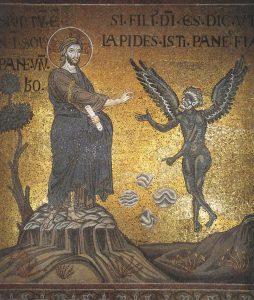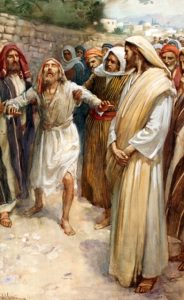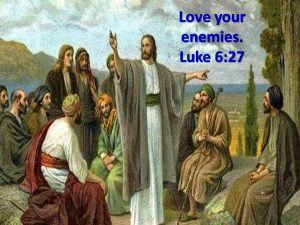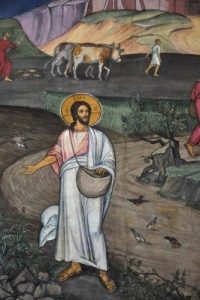Today is the 4th Sunday of Lent, and I’m glad to be relieved from celebrating the Extraordinary Form, the Traditional Latin Mass, after over 6 years. It was indeed a real sacrifice on my part ministering two communities, but I was also blessed to be given this opportunity which helped me change my attitude in celebrating mass with profound devotion and love for the Eucharist.
The readings today speak about the tenderness of God. Focusing on the gospel, Jesus narrates the story of “a man with two sons,” which we know as the story of the Prodigal Son. Having heard this story many times, it never loses its power to inspire and to move us deeply. I presume this will help us be able to understand and continue to be conscious that we are on a pilgrimage in this Jubilee Year of Hope.
In the 1st reading from the Book of Joshua, we are reminded about the Israelites’ journey from Egypt into the promised land, the land of Canaan. There was a celebration of freedom and enjoyment of the produce of this new given land. As a chosen people, their new homeland is filled with abundant blessings in the midst of the fertility of its land and the offspring as signs of God’s care. God had been faithful to the covenant by granting them freedom and feeding, not the manna, but from their sweat and toil in their new abundant land.
In the 2nd reading, taken from the second letter of St. Paul, the apostle taught repentance and reconciliation to the people of Corinth as related to the newness of life in Christ. “All this is from God, who has reconciled us to himself through Christ.” It means that God goes out by providing a bridge between heaven and earth in the person of Jesus Christ. (v.18) St. Paul proposes this message of conversion.
The gospel, taken from St. Luke, is known as the story of the “Prodigal Son.” This gospel parable has been captured by the great artwork of Caravaggio in which the repentant son is embraced and welcomed by his father. The father waited patiently for this moment, not waiting for any words from his son, because the father deeply knows the sorrow of his young son’s heart. Let us explore the very touching moments of this gospel:
First, I know that Jesus has the heart for sinners, scribes and Pharisees. They want to listen to Him, but people criticized Jesus, saying, “This man welcomes sinners and eats with them.” However, I believe it was not going to a party with sinners, but instead it points us towards the very mission of Jesus to call them to the eternal kingdom. Welcoming sinners back to God’s fold, there could be no better reason for a joyful celebration.
Second, we heard about the younger son’s story who spent his entire inheritance on pleasure and misery by disobeying his father. He desperately realizes that his condition is far worse than the pigs he is caring for. They have more to eat than he does. He was confronted by his conscience, shame and regret until he finally arrived at his breaking point. He rises on his way back to his father, ready to disclaim his sonship and to work for his generous father. Instead his father robed him with fine linen, put a ring on his finger and sandals on his feet, symbolizing an immediate restoration of his dignity as son.
We come to the point in our lives when we too have sinfully squandered the many gifts in our lives as if there was no end of fleeting joy, sexual excess, pride and rejections of God. However, when we open our heart to the patience of God, diligently opening His hands to reach out to us like the younger son, we return to the Father for forgiveness. He embraces us with joy and without judgment, though undeservedly. I pray that we all feel the abiding trust in God’s love and mercy.
Third, the elder son was not in the mood for celebrating his younger brother’s return. He does not want to have anything to do with the celebration, and instead he felt envious. The father said to him, “You were never lost, but your brother was dead and gone, but now he has come to life again, he has been found.” The father recalls to his elder son that they have always been together and in love have shared in everything.
God is patient and forgiving as represented by the father in the parable. The teaching point of Jesus expresses that God never separates from even the worst sinner. We must be receptive to God’s will to reconcile us back to Him. Our own realization about who we are is already an encounter with God, especially when we go to confession, where the caress of the mercy of Jesus Christ is granted upon all the penitents.
Everyone who returns to God is cause for rejoicing and celebrating. “Let us celebrate with a feast, because this child of mine was dead, and has come to life again; they were lost, and they have been found.” (vv. 23-24) During this Lent return to God, the source of life, and accept the truth that we have received the very lives with joy and gratitude. Though we have wandered, the Eucharist is our Home where we are all welcome. Prodigal children and sinners, though we may be, Jesus embraces us tightly and His love is undivided.
God bless you.
Fr. Arlon, osa
—————-
El Dictado del Corazón
Cuarto Domingo de Cuaresma, Año C
- Josué 5:9a, 10-12
- Salmo 34:2-3, 4-5, 6-7
- 2 Corintios 5:17-21
- Lucas 15:1-3, 11-32
Hoy, mientras nos reunimos en el Cuarto Domingo de Cuaresma, reflexionamos sobre el tierno amor de Dios y el llamado a regresar a Él. Estoy agradecido por la oportunidad de haber celebrado la Forma Extraordinaria de la Misa por más de seis años. Fue un sacrificio ministrar a dos comunidades, pero al hacerlo, fui bendecido al crecer en mi devoción y amor por la Eucaristía.
Las lecturas de hoy hablan de la profunda misericordia de Dios, especialmente a través del Evangelio. En la Parábola del Hijo Pródigo, Jesús nos muestra el corazón del Padre—paciente, perdonador y siempre dispuesto a abrazar al pecador. Esta historia, aunque familiar, siempre nos conmueve profundamente y nos recuerda de que somos peregrinos en un viaje hacia el corazón de Dios en este Año Jubilar de la Esperanza.
En la primera lectura, escuchamos acerca de los israelitas, que fueron esclavos en Egipto, pero ahora entran en la tierra prometida de Canaán. La tierra fluye con abundancia, marcando un nuevo comienzo para el pueblo elegido de Dios. Ya no dependen del maná del cielo, sino de los frutos de su trabajo, una señal de la fidelidad de Dios. Así como Dios alimentó a su pueblo en el desierto, ahora los nutre en esta nueva tierra fértil.
San Pablo, en la segunda lectura, hace eco del llamado a la reconciliación, instando a los corintios a abrazar la nueva vida que viene a través de Cristo. “Todo esto proviene de Dios, quien nos ha reconciliado consigo mismo a través de Cristo”, escribe. Esta novedad de vida nos invita al abrazo de Dios, ofreciéndonos perdón y un nuevo comienzo.
Y luego, en el Evangelio, escuchamos la familiar pero siempre conmovedora historia del Hijo Pródigo. Hagamos una pausa y reflexionemos sobre los poderosos momentos dentro de esta parábola:
Primero, la misión de Jesús se revela en su relación con los pecadores. Los fariseos lo criticaban por asociarse con los pecadores, pero Jesús no solo estaba socializando con ellos; los estaba llamando al Reino de Dios. Su misión fue, y sigue siendo, acoger a los perdidos, traerlos de vuelta a casa y celebrar su regreso con gran alegría.
Segundo, el viaje del hijo menor es trágico pero transformador. Desperdicia su herencia en placeres y queda despojado, alimentando cerdos en una tierra extranjera. Su corazón se quiebra y su conciencia lo mueve a regresar a su padre, no como hijo, sino como siervo. Pero cuando regresa, su padre corre hacia él, lo abraza e inmediatamente lo restaura a su antigua dignidad—simbolizada por la túnica, el anillo y las sandalias. Este es un hermoso recordatorio de que, sin importar cuán lejos hayamos ido, cuando nos arrepentimos y regresamos a Dios, Él nos recibe con los brazos abiertos y nos restaura a nuestro lugar legítimo como sus hijos amados.
Nosotros también, muchas veces, hemos malgastado los dones que Dios nos ha dado—persiguiendo placeres pasajeros y apartándonos de su amor. Sin embargo, cuando abrimos nuestro corazón a la gracia de Dios, Él espera pacientemente nuestro regreso. Su misericordia es abundante e inquebrantable. Al hacer nuestro camino de regreso a Él, podemos estar seguros de su abrazo amoroso, pues Su amor no se basa en nuestra dignidad, sino en Su misericordia infinita.
Tercero, vemos la reacción del hijo mayor. Él resiente la celebración del regreso de su hermano. Sus celos y amargura le impiden comprender la profundidad de la alegría del padre. El padre le recuerda: “Tú siempre has estado conmigo, y todo lo que tengo es tuyo. Pero tu hermano estaba muerto y ha vuelto a la vida; estaba perdido y ha sido encontrado.” El amor de Dios es infinito, y Su corazón se regocija siempre que los que están perdidos son encontrados. Nosotros también debemos regocijarnos en el regreso de los pecadores, no guardar resentimientos, sino celebrar la misericordia de Dios.
A través de esta parábola, Jesús nos enseña que el amor y el perdón de Dios no tienen límites. No importa cuán lejos nos desviemos, no importa nuestros pecados, Dios siempre está listo para abrazarnos cuando volvemos a Él. La Cuaresma es el tiempo perfecto para regresar a Dios, la fuente de toda vida, con corazones llenos de gratitud. Y al hacerlo, se nos recuerda que la Eucaristía es nuestro hogar, donde siempre somos bienvenidos.
En el Sacramento de la Reconciliación, experimentamos el tierno abrazo de la misericordia de Dios. Así como el padre corre a encontrar a su hijo, así también Dios corre a encontrarnos en nuestra necesidad. Esta es la gran alegría del Evangelio—los perdidos son encontrados, los muertos vuelven a la vida.
Abramos, pues, nuestro corazón a la abundante misericordia de Dios durante esta temporada de Cuaresma. Regocijémonos de que, sin importar cuán perdidos nos sintamos, el Padre siempre nos está esperando, con los brazos abiertos, para recibirnos.
Que Dios los bendiga a todos.
Padre Arlon, OSA

